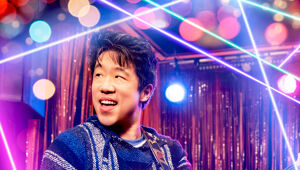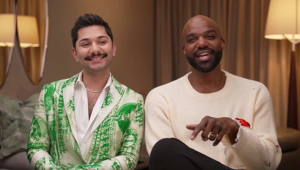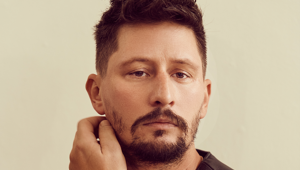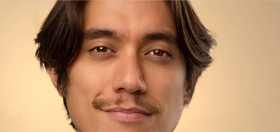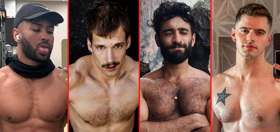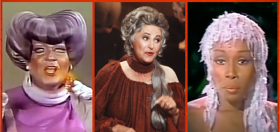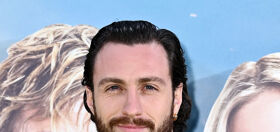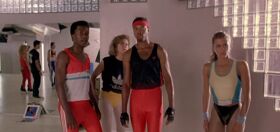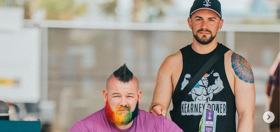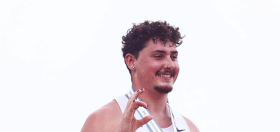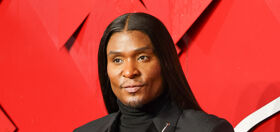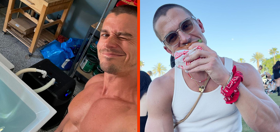
Often times queer films deal with elements of LGBTQ life: the struggle for equality, coming out, and falling in love. Sometimes though, they deal with queer people just trying to live.
Through the Glass Darkly, the new feature from director Lauren Fash, falls into the latter category. It plays the virtual Frameline44 Film Festival through September 27.
The film stars 80s teen queen Robyn Lively (Teen Witch, The Karate Kid) as Charlie, a butch, small-town lesbian reeling from the unsolved abduction of her daughter. More than a year after her daughter’s abduction, her relationship with her longtime partner has dissolved, and she’s descended into alcoholism. Then, when the daughter of Trip Carmichael (Michael Trucco)–the wealthiest man in town–goes missing, Charlie joins forces with an ambitious reporter, Amy (Shanola Hampton) to stop the kidnapper.
Fash emerged as a filmmaker after studying at the University of Southern California, and following work on major films including Inception, Wanted, and The Dark Knight Rises. After directing several short films, she emerged as a feature director with Out and Around, a documentary about American queer activists connecting with the leaders of the LGBTQ Rights movement in other nations. Through the Glass Darkly, which she penned with her wife Susan “Suz” Graham, marks her debut as a narrative director.
How about we take this to the next level?
Our newsletter is like a refreshing cocktail (or mocktail) of LGBTQ+ entertainment and pop culture, served up with a side of eye-candy.
With Fash laid up awaiting knee surgery, Queerty caught time with her to discuss the film, her ambitions, and the unexpected, breakthrough performance by its star. Through the Glass Darkly plays Frameline44 through September 27.
So this is your first scripted feature. Where did the story come from?
I basically did a short film right out of film school inspired by a true story. I was trying to get the life rights, but a producer saw the film and said he wanted to produce it for me. But, he said he wanted me to make a first feature first. So that what sparked the idea. I needed something that I could put my name on that I could feel really comfortable about. I started doing research, and to be honest, the whole feeling was let’s go make a movie. It was supposed to be a means to an end, which sounds terrible. But I don’t know how to make something easy. I decided to do the hardest thing possible, to write the most difficult genre to execute and do well. It just kind of happened that way. I had personal things going on in my life that influenced it, but it just kept growing. We did 14 drafts.

Oh dear Lord.
Yeah. Epic rewrites too. It was seven years all said and done. We started writing in 2013 and went into production in 2018. The film has been in post since.
That’s amazing. Was your intention to work with Susan?
Yeah. She’s my boss and my wife. We write together, and she produces everything I do. She’s in law school right now, so eventually, she’s going to be my wife, boss and lawyer.
That’s wonderful, though that opens up a whole other line of questioning. When you’re romantically involved with a creative partner, how do you resolve disputes? How do you keep the pressures of work from invading your home life together?
It’s tricky. You have to be adamant about keeping work and your personal life separate. When we work together, when we write together, I’m not easy to work with.
How’s that?
I’m stubborn and set in my ways. I argue. That’s just how I operate. But she knows how to handle me. We push each other. We make each other better because we push each other to the limit. That’s why we continued to do all those drafts. We had to tell the best story possible, so we kept going. It’s true for the film too. We put everything we had into this movie—a lot of blood sweat and tears. But it’s been the most exciting, frustrating, humbling, amazing experience of my life. Fighting with her was just the beginning, but I couldn’t imagine not working with her. She’s extraordinary.
Had you always intended for the film to have a lesbian lead character?
No, actually. The movie was originally called Stan, and it was about a straight white guy who had a similar journey in terms of character flaws. Again, the intention was to get the movie made and seen. It’s embarrassing to admit this, but in your mind, you go how will this sell? And so I think that’s where I was coming from. One of the producers read it and wasn’t connecting with the character, and we realized we weren’t either.

Oh wow.
Not to say if you’re a straight guy, you have to write a straight character, or a lesbian has to write a lesbian character. I don’t think that’s true at all. We weren’t really able to grasp the character, so we created Charlie. And I feel like I know Charlie; I put a lot of myself in that character. I was able to give her a unique, definitive voice. So it happened organically.
How was the lesbian content received after the rewrite? Did that hurt the marketability to producers?
It was the opposite reaction. Not many people read the script. Those who did loved that it was not a “gay” movie. It was a movie that happened to have a lead who is gay. But it wasn’t going to have a niche audience. I have a commercial taste. I love all kinds of film but I love the stuff I grew up on, and I wanted a broad audience. At the end of the day it’s a psychological drama, and that’s a popular genre. But it was incredibly well-received, and that has everything to do with Charlie as a character, not that she’s gay.
Related: Henry Golding goes gay, organized crime in drag and boys in love: Join the Frameline44 Redux
She’s very compelling as a character, as is the actress playing her, Robyn Lively. How did Robyn get involved? It’s one of her best performances, I think, and very different from any other character I’ve seen her play.
It’s so funny you say that. Robyn and I joke with each other: had I known her before we started casting, I never would have cast her. Robyn could not be more different from Charlie. She has most feminine, expressive, happy disposition. Charlie’s the complete opposite.

So then how did she land the role?
It’s a great story, actually. We teamed up with ICM in the script stage, which was a big win for us. With any indie film, you’re always worried about how you’re going to sell it. Getting investors is difficult. So ICM was great because having a name attached to an indie film is the best way to do that. That being said, it was also difficult. This is not a role that just anyone could step into.
No.
This is a character role. I had the entire film cast. The only person I didn’t have cast was Charlie. I was in Atlanta, in pre-production and I called the casting director and said we needed to see some people on tape. So they taped in LA and sent me five or seven auditions. I couldn’t tell you, because the only audition I watched was Robyn’s.
Wow.
I was in the office. It was like 10 pm on a Friday night. The producers were arguing about something. And I got an email from the casting directors. So I clicked on the link, and I see Robyn. I started watching and…it was a movie moment in and of itself. It was the best audition I’ve ever seen. It was like, who is this actress? So I shushed the producers and told them to look at the audition. When I turned around, everyone was silent in awe. Someone had a tear in her eye. It was the moment we found Charlie. We had to get Robyn Lively.
That’s amazing.
I called her and talked to her for a minute, just to make sure she wasn’t crazy. As soon as we hung up, I ended up calling her right back and telling her she was in the film. It’s incredible: you create someone out of thin air. Then, to watch an actor breathe life into it in such an organic and honest way: she nailed it. So I never even watched the other auditions.

That’s a fabulous story. Charlie, as a character, is wildly frustrating at times. Granted, the reasons for that are complicated. But how do you make her relatable in the sense that her demons don’t overshadow her?
That’s a great question. It’s one of the trickiest things for me to do as a writer. You have to set up. That’s part of storytelling: the arc of a flawed human being and seeing that journey. I relied a lot on Robyn’s innate charm. She’s a compelling actress, and you don’t want to stop watching her. So you forgive a lot by this human being she’s creating. You go along the ride even though she is frustrating. Her performance is so nuanced, in that Charlie has this tough exterior and broken interior. Robyn allows you to see into the depths. We describe Charlie as “her vanity had been subsumed by her suffering.”
I love that.
It’s so interesting when you see an actor who does verbatim what you write the character to be. I’m still floored by how she nailed it.
Her performance is what makes the film work.
I couldn’t agree more. She’s in every scene.
This is a film about secrets, and overwhelmingly a film about femininity: bonds between women, the social position of women, family roles for women, and guilt women feel. What do you want the rest of us to see and learn about women looking at your films?
I think within the film you see women helping women, and not necessarily in a kind manner. I love what you say about femininity, and how we play with those roles. For me, I like strong interesting characters, so I wrote a script around complex, interesting women. I’m drawn to women because that’s what I know, and I want to see more. Suz and I both were adamant about bringing our own experience to the film. So that’s part of it as well. It’s exciting to see a shift happening now.
So, before this, you worked on several Christopher Nolan films.
I did.
He’s probably one of the five best directors working right now. What do you learn being on one of his sets?
It’s interesting. I worked on Inception while I was on film school, and The Dark Knight Rises. And it’s a funny thing: I was a useless production assistant.
[Laughter]
If I were me now, I wouldn’t hire myself. But my best friend at the time was the key production assistant, so I got away with doing nothing. My only goal was to listen to Chris Nolan talk to his actors and to Wally Pfister, his Director of Photography. So every day, the only thing I did, was figure out how to get behind the camera to see them work. I would do my paperwork and find an excuse to go to set.
That’s hilarious.
It’s funny. Even on a huge set like that, there aren’t many people behind the monitor. And everybody knows everybody who is supposed to be on monitor, because you’re really not supposed to be back there unless you’re a certain person. Which I wasn’t. So I would always stay long enough until people would start looking at me. I actually learned a lot by conning my way in there. On a set like that, where it’s enormous, I ultimately learned that it’s important to direct my own stuff. Even though the scale was massive—it doesn’t get bigger than Christopher Nolan—the real foundation of what they were doing was what I learned in film school. I learned I needed to be directing. It really inspired me.

I don’t want to give anything away here, but the final moment of the film sets a very different tone from the resolution of the plot. For our purposes, I’ll say the pain of a character does not get resolved. In your mind, can said character ever find peace?
I’m trying to figure out how to word this without giving away the ending of the movie. To me, the ending is a comment on the reality of the situation. It’s a realistic ending, not a movie ending. I chose reality over sentiment because that character does find peace, at least as much as possible. That’s one thing that drew me to the story: dealing with grief. I lost my dad when I was 17, and it shattered my world. A lot of what Charlie struggles with in terms of guilt and grief is what I bring to it from my experiences. It’s not a feel-good movie, but my goal was to grab the audience and take them on a ride.
Do you intend to keep doing scripted features, or do you plan to go back into documentary? What’s next?
I love documentary film, but they’re passion projects for me. I think they are so important, and they push me to my limits as a storyteller, but I wouldn’t consider myself a documentary filmmaker. I’m producing some docs, but I don’t see that in the future for me. I have another script out that’s a coming of age comedy—sort of the opposite of this. And that will be totally outside my comfort zone. Again, I’m trying to punish myself.
[Laughter]
That’s my goal with my career—to do something I feel nervous doing. I just love film. I thrive in it. That’s where I see myself in the future. I just want to make movies.
Through the Glass Darkly plays the virtual Frameline44 through September 27.


